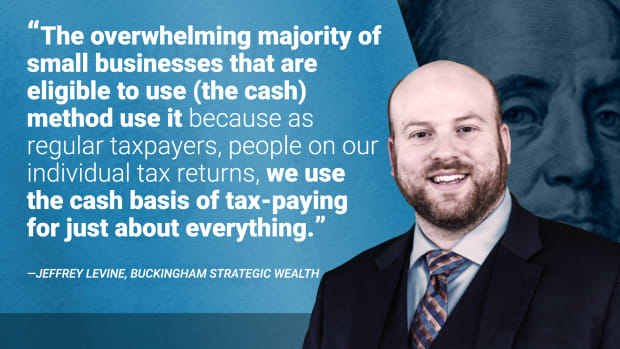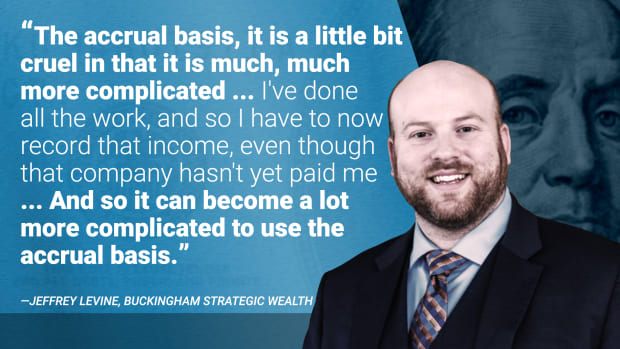If you are an entrepreneur or small business owner, it is a good idea to familiarize yourself with both the cash and accrual accounting methods.
What is Cash Accounting Method?
So, what's the difference between cash and accrual accounting methods? Cash and accrual accounting methods are among the most common methods of accounting, according to the IRS.
The IRS Publication 538 (01/2022), Accounting Periods and Methods breaks down the two methods. First, the cash accounting method is when money flows in or out of a company and the transaction is when the cash is reported in the same year, while the expenses can be reported in the tax year that it is spent.
What is Accrual Accounting Method?
The accrual method, on the other hand, is when a small business reports the income in the tax year earned, regardless of when it is received. Meanwhile, those expenses are deducted in the year they happen, no matter when the actual payment is made.
No matter which method a small business uses, the IRS notes that a consistent payment method must be used.
Our TurboTax Live experts look out for you. Expert help your way: get help as you go, or hand your taxes off. You can talk live to tax experts online for unlimited answers and advice OR, have a dedicated tax expert do your taxes for you, so you can be confident in your tax return. Enjoy up to an additional $20 off when you get started with TurboTax Live.
Q&A| Accrual vs. Cash Accounting Examples
TheStreet, combined with our partners at TurboTax, provides financial and tax strategies throughout the year. Our Retirement Daily's Robert Powell caught up with Jeffrey Levine, CPA and tax pro from Buckingham Strategic Wealth Partners, for the below Q&A about the two common accounting methods.
Robert Powell: Three things are certain in life, death, taxes, and tax tips with Jeffrey Levine from Buckingham Wealth Partners. Jeffrey, when we think about tax tips, there's one that has to do with being a solo entrepreneur and whether they should use the cash or accrual method accounting method.
Why Most Entrepreneurs Choose the Cash Method of Accounting
Jeffrey Levine: Absolutely. And the first thing I talk to people about when they're deciding whether to use the cash basis or the accrual basis is the cash basis method is much easier. And that's why the overwhelming majority of small businesses that are eligible to use that method use it because as regular taxpayers, people on our individual tax returns, we use the cash basis of tax-paying for just about everything.
Now, the cash basis method means when you pay something it is deemed paid, it seems to make sense, right? When you pay something, you have an expense. When you get income, you actually record income.
Accrual Accounting Method Example
The accrual basis is a little bit cruel in that it is much, much more complicated. So for instance, let's say that Bob, I have agreed to do some project work for a company and I have done all the work and they just haven't yet paid me, but I finished it. Well, the accrual basis effectively matches the income from that contract, right? I've done all the work, and so I have to now record that income, even though that company hasn't yet paid me. And maybe they don't pay me for another two or three months, and sometimes that may cross over into different years. And so it can become a lot more complicated to use the accrual basis. We don't really think about that.
Quotes| Accrual vs. Cash Accounting: What's Best for Small Businesses?

Jeffrey Levine, Chief Planning Officer, Buckingham Strategic Wealth

Jeffrey Levine, Chief Planning Officer, Buckingham Strategic Wealth
Now, the reason large companies do it right is that if you are a Fortune 500 company, you're traded on a stock exchange, and you tend to use the accrual basis because it is a more precise way of recording things. Because if I don't get paid for two months from now, well, I still did earn that income right? If I've done everything that I need to do in order to get paid. I'm just waiting for the check to arrive in the mail, but it lets investors know that I did something to generate income.
Cash Accounting Method Example
With the cash basis, maybe I have a supplier that just doesn't pay me. In fact, you know, if you imagine you do all this work, and they just write you a check on December 31st every year for your entire year's worth of work. Well, on December 30th, it looks like you've done nothing. You've got no revenue. You've done absolutely nothing. But then on December 31st, it looks like you had the best day in the history of the world. Now, neither of those things are really true, but in the cash-based system, that's what it would look like.
In the accrual-based system, you'd effectively have that income, and I'm oversimplifying here to make things understandable for folks, but you'd effectively see that revenue is earned throughout the year as you were really doing the work. And the fact that you got paid on December 31st wouldn't really impact the way your business looked on paper.







